Autonomous vehicles, also known as self-driving cars, have the potential to revolutionize transportation, making it safer, more efficient, and more convenient for millions of people around the world. However, with this new technology comes a host of ethical dilemmas and questions that need to be addressed, particularly when it comes to accidents and who is responsible when they occur kpop pantip.
One of the primary ethical concerns with autonomous vehicles is that they have the potential to cause accidents and harm to people, just like human drivers. However, because they are controlled by software and sensors monadesa, it can be difficult to determine who is responsible when an accident occurs. Is it the fault of the car manufacturer? The software developer? The owner of the vehicle? Or some combination of these parties?
To complicate matters further, autonomous vehicles also raise questions about the role of human decision-making in accidents. For example, in a situation where an autonomous vehicle has to choose between hitting a pedestrian or crashing into a wall, who makes the decision about what action to take? Is it the car’s programming, or is it a human operator who is responsible for monitoring the vehicle’s behavior nobedly?
Another ethical issue with autonomous vehicles is that they have the potential to exacerbate existing inequalities in society. For example, autonomous vehicles may be expensive to purchase or operate, meaning that only wealthy individuals or companies may be able to afford them. This could lead to a situation where only certain segments of the population have access to the safety and convenience benefits of autonomous vehicles, while others are left to rely on less safe and less efficient modes of transportation respill.
There are also concerns about the impact of autonomous vehicles on employment, particularly in the transportation sector. As more and more vehicles become autonomous, it is possible that many drivers, from truckers to taxi drivers, may lose their jobs, leading to significant economic and social disruption blazeview.
So, who is responsible when an autonomous vehicle is involved in an accident? There is no easy answer to this question, as it depends on a number of factors, including the specific circumstances of the accident and the legal framework in which it occurred. In some cases, it may be clear that the car manufacturer or software developer is at fault, either because of a defect in the vehicle or a flaw in the programming. In other cases, it may be the fault of the owner of the vehicle, for example, if they failed to properly maintain the vehicle or make necessary repairs.
One possible solution to these ethical dilemmas is to establish clear regulations and standards for autonomous vehicles. This could include mandatory safety standards for vehicles, as well as guidelines for how they should be operated and maintained. It could also include establishing liability frameworks that clearly outline who is responsible in the event of an accident.
Another possible solution is to develop advanced artificial intelligence systems that are capable of making ethical decisions in complex situations. For example, an autonomous vehicle could be programmed to prioritize the safety of human life above all else, even if that means sacrificing the safety of the vehicle’s occupants. This would require significant advances in the field of artificial intelligence, but it could ultimately lead to a safer and more ethical transportation system.
In conclusion, the ethics of autonomous vehicles are complex and multifaceted. As this technology continues to develop and become more widespread, it will be important for policymakers, industry leaders, and the public to grapple with these ethical issues and develop solutions that prioritize safety, equity, and accountability. Ultimately, the success of autonomous vehicles will depend not just on their technical capabilities, but on their ability to integrate with and benefit society as a whole.

